|
|
|
Sort Order |
|
|
|
Items / Page
|
|
|
|
|
|
|
| Srl | Item |
| 1 |
ID:
152796


|
|
|
|
|
| Summary/Abstract |
In international development, shared ownership is assumed to be a condition for effectiveness. Academic studies question this relation, claiming shared ownership can instead lead to ineffectiveness. This study analysed the interplay between ownership and effectiveness in a transnational advocacy network for conflict prevention observed 2012–2015. Building on recent discussions about balancing unity and diversity in networks, this article unpacks the ownership/effectiveness relationship into three dimensions: collective identity, accountability processes and a shared advocacy message. We find that the question is not about more or less effectiveness, but about the processes shaping the meaning of effectiveness in particular institutional constellations.
|
|
|
|
|
|
|
|
|
|
|
|
|
|
|
|
| 2 |
ID:
193481


|
|
|
|
|
| Summary/Abstract |
The rights of people who are marginalised by their sexual orientation and gender identity (LGBTI) have improved in many countries. Largely, these achievements can be traced back to the ‘spiral model’ of factors including transnational mobilisation by the LGBTI rights movement, the actions of a few pioneering governments, and advances in the human rights frameworks of some international organisations (IOs). Yet a rising and increasingly globally connected resistance works against LGBTI rights. It rests predominantly in the hands of a transnational advocacy network (TAN) that attempts to lay claim to international human rights law by reinterpreting it. Drawing on a decade of fieldwork and 240 interviews with LGBTI, anti-LGBTI, and state and IO actors, this article explores how the conservative TAN functions, in terms of who comprises it and how its agenda is constructed. We argue that this TAN has employed many of the same transnational tools that garnered LGBTIQ people their widespread recognition. It also conforms to the spiral model of rights diffusion, but in a process we call a double helix. As the double-helix metaphor suggests, rival TANs have a reciprocal relationship, having to navigate each other’s presence in an interactive space and thus using related strategies and instruments for mutually exclusive ends.
|
|
|
|
|
|
|
|
|
|
|
|
|
|
|
|
| 3 |
ID:
108964
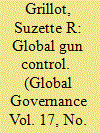

|
|
|
|
|
| Publication |
2011.
|
| Summary/Abstract |
The global spread and misuse of small arms is one of the most alarming and growing security issues of the post-Cold War era. For many reasons, however, controlling the spread of small arms is extremely difficult. Nonetheless, given the serious nature of the small arms issue, numerous states, nongovernmental organizations, and individual activists have sought to address various small arms problems. One of the earliest suggestions that analysts and advocates offered was to develop international norms and standards of behavior that outline the parameters of acceptable small arms activities. Despite the numerous actions that states and NGOs have taken over the past ten years in an effort to combat these problems, corresponding norms are relatively weak or nonexistent. This article seeks to answer why this is the case. It examines why global small arms control norms are largely weak or nonexistent and explains why the prospects for stronger norms are few. Although research on norms in international relations is swelling with studies showing whether, how, and why norms emerge and affect state behavior, few studies focus on cases where norms actually do not emerge or influence action. The primary explanation for weak small arms norms is a competitive normative environment that is facilitated and perpetuated by: (1) competing coalitions that promote opposing norms and ideas and (2) a great-power consensus that works against stronger arms control norms.
|
|
|
|
|
|
|
|
|
|
|
|
|
|
|
|
| 4 |
ID:
088080
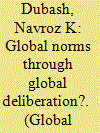

|
|
|
|
|
| Publication |
2009.
|
| Summary/Abstract |
In recent years, global "deliberative processes" bringing together government, civil society, and private sector actors have become increasingly common on the global stage. Past work on these processes has either read them as relatively unproblematic consensus-building exercises, or exercises in global corporatism. Using a case study of the World Commission on Dams, this article explores how formal global deliberative processes can be a strategy for global norm formation and legitimation. It suggests that global deliberation can indeed be a vehicle for emergence and propagation of norms, but that these processes face multiple challenges that are structural in nature. Three factors are identified as key elements in understanding norm emergence through global deliberation: the legitimacy of global deliberation linked to questions of representation and democratic procedure; the micropolitics of norm emergence; and the process through which incipient norms are institutionalized by states.
|
|
|
|
|
|
|
|
|
|
|
|
|
|
|
|
| 5 |
ID:
171841
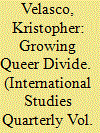

|
|
|
|
|
| Summary/Abstract |
Despite years of success, lesbian, gay, bisexual, and transgender (LGBT) norms are becoming increasingly polarized across the global landscape—with some countries strongly complying with new expectations while others openly defy them. To explain these divergent paths, I investigate the transmission of global LGBT norms via two mechanisms: transnational advocacy networks and foreign aid conditionalities. In examining LGBT policy adoption across 110 non-Organisation for Economic Co-operation and Development (OECD) countries between 1990 and 2016, I find evidence that the process through which states are exposed to LGBT norms can indeed help explain these different approaches. Exposure to LGBT norms through transnational advocacy networks enhances the effect of these norms and is associated with more progressive policy adoption, while greater dependence on foreign aid pushes states to reject LGBT norms. Consequently, this study provides new insights into how the mechanism through which countries are exposed to norms shapes compliance and adds new evidence questioning the effectiveness of foreign aid as a tool to advance LGBT rights.
|
|
|
|
|
|
|
|
|
|
|
|
|
|
|
|
| 6 |
ID:
118162


|
|
|
|
|
| Publication |
2012.
|
| Summary/Abstract |
This study tests the effectiveness of naming and shaming by transnational advocacy networks in reducing the severity of ongoing instances of genocide or politicide. I argue that naming and shaming should force perpetrators to reduce the severity of these ongoing atrocities in order to shift the spotlight, save their reputation, reframe their identity, maintain international legitimacy and domestic viability, and ease pressure placed on them by states or IOs. I test whether naming and shaming by NGOs, the media, and IOs significantly reduces the severity of the killing. Ordered logit analyses of ongoing genocides and politicides from 1976 to 2008 reveal that naming and shaming by Amnesty International, the Northern media, and the UNCHR have significant ameliorative effects on the severity of the most extreme atrocities. Transnational advocacy networks have the potential, through naming and shaming, to lead to life-saving changes in these murderous policies.
|
|
|
|
|
|
|
|
|
|
|
|
|
|
|
|
| 7 |
ID:
160883
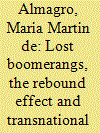

|
|
|
|
|
| Summary/Abstract |
This article aims to show the added value of studying transnational advocacy networks through a discursive approach in order to better understand the outcomes of norm diffusion in postconflict contexts. I argue that constructivist approaches to norm diffusion fall short as an explanation of norm adoption because they assume an automatic process of norm propagation through socialisation mechanisms. The first goal of the article is then to discuss how the internal dynamics of discourse negotiation in transnational advocacy networks impact the diffusion and implementation of international norms. The second goal is to propose the concept of the rebound effect and to explore the conditions under which it takes place. Through data collected during extended fieldwork, the article examines a prominent case, namely the transnational campaign for the implementation of United Nations Security Council Resolution 1325 on Women, Peace, and Security in Burundi and Liberia. I ask why and how the campaign was understood as a success in Liberia and as a failure in Burundi. I argue that there is another way of looking at these cases in less dichotomised ways. Crucially, my findings demonstrate how in both cases a very particular discourse on gender security is (re)produced through power relations between local and transnational activists limiting the type of policies that are advocated for and depoliticising the grassroots.
|
|
|
|
|
|
|
|
|
|
|
|
|
|
|
|
| 8 |
ID:
167430


|
|
|
|
|
| Summary/Abstract |
Recent scholarship presents conflicting views on the ability of grassroots movements to resist neoliberal globalization. This article moves beyond this broad debate. It explores the specific challenges and opportunities faced by networks of the marginalized, and their allies, as they attempt to transform neoliberal global governance. The Global Alliance of Waste Pickers, a transnational advocacy network of informal recyclers and their allies, sought to influence the practices of the Clean Development Mechanism between 2009 and 2015. I assess their efforts via a “historical dialectic” framework that bridges neo-Gramscian theory with liberal constructivist scholarship. It differentiates between more and less “embedded” networks, categorizes distinct forms of policy change, and helps us to understand the factors that contribute to more or less transformative policy gains. I identify four distinct forms of policy: transformative, concessional, problem-solving, and maintenance. I argue that the network gained mostly concessional, rather than transformative, changes. My analysis suggests that concessional gains are likely in contexts in which embedded advocacy networks effectively combine discursive and institutional forms of leverage but fail to mobilize political leverage in the form of a powerful “counterhegemonic bloc.”
|
|
|
|
|
|
|
|
|
|
|
|
|
|
|
|
| 9 |
ID:
161330
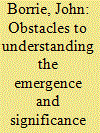

|
|
|
|
|
| Summary/Abstract |
This article examines the emergence of the UN Treaty on the Prohibition of Nuclear Weapons from a critical perspective, including how and to what degree efforts to alter states’ framing of nuclear weapons was a factor in the treaty's emergence and negotiation. It examines the so-called humanitarian initiative on the consequences of nuclear weapons, the activities of the International Campaign to Abolish Nuclear Weapons and the roles played by transnational institutions like the United Nations and the Red Cross Movement. In view of this case, lessons and limits on transnational advocacy network models of norm emergence are highlighted. In order to contribute to the process of better understanding the emergence and significance of the prohibition treaty process based on research, some areas are identified in which evidence gathering and theorizing are needed.
|
|
|
|
|
|
|
|
|
|
|
|
|
|
|
|
| 10 |
ID:
079899
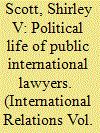

|
|
|
|
|
| Publication |
2007.
|
| Summary/Abstract |
The intervention of international lawyers in public debate in the US, UK and Australia regarding the 2003 invasion of Iraq spotlighted the political agency of international lawyers in according or withholding legitimacy from major foreign policy decisions and raised the question of how to delimit the scope of international lawyers' political agency. Rejecting the close fit of either the transnational advocacy network or epistemic community concepts to the role played by the collectivity of international lawyers, this article identifies factors that both permit international lawyers to function as the grantors or withholders of foreign policy legitimacy and serve to define the limits on their fulfilling that role
|
|
|
|
|
|
|
|
|
|
|
|
|
|
|
|
| 11 |
ID:
158738


|
|
|
|
|
| Summary/Abstract |
Theoretically, this article reveals the long-term risk for local non-governmental organisations (NGOs) of participating in transnational advocacy networks (TANs), accepting money from foreign sources and throwing ‘boomerangs’ internationally—a strategy used by local NGOs to seek international allies to pressure repressive and unresponsive states at home. Focusing primarily on the suppression of environmental NGOs that oppose natural-resource extraction, this article examines three cases—Russia, India and Australia—to illuminate the consequences of this trend for local civil society and TANs. It also documents a global trend towards states depicting local NGOs with international linkages as subversive agents of foreign interests, justifying legal crackdowns and the severing of foreign funding and ties. State framing of NGOs as agents of foreign interests is repressing local environmental activism, depoliticising civil society and weakening international NGO alliances—a conclusion with far-reaching consequences for the future of TANs, local NGOs and environmental activism.
|
|
|
|
|
|
|
|
|
|
|
|
|
|
|
|
| 12 |
ID:
165679
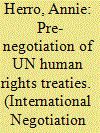

|
|
|
|
|
| Summary/Abstract |
Since 1965, nine UN human rights treaties have been adopted. Surprisingly, we know little about the conditions under which states arrived at the negotiation table because there has been no serious attempt to empirically identify the unique attributes of pre-negotiation in this context. This article examines the pre-negotiation of the UN Convention on the Rights of Persons (CRPD), drawing on diverse qualitative data sources such as interviews with state and non-state participants. Informed by a constructivist perspective, this study identifies esteem-seeking behavior as a key motivation for some states to negotiate. The article also shows how a transnational advocacy network influenced the pre-negotiation process by leveraging states’ esteem-seeking ambitions and appealing to their reputation as a way of pushing parties to negotiate. Additional tactics that the transnational advocacy network employ at the international level to expedite negotiations are also identified.
|
|
|
|
|
|
|
|
|
|
|
|
|
|
|
|
|
|
|
|
|